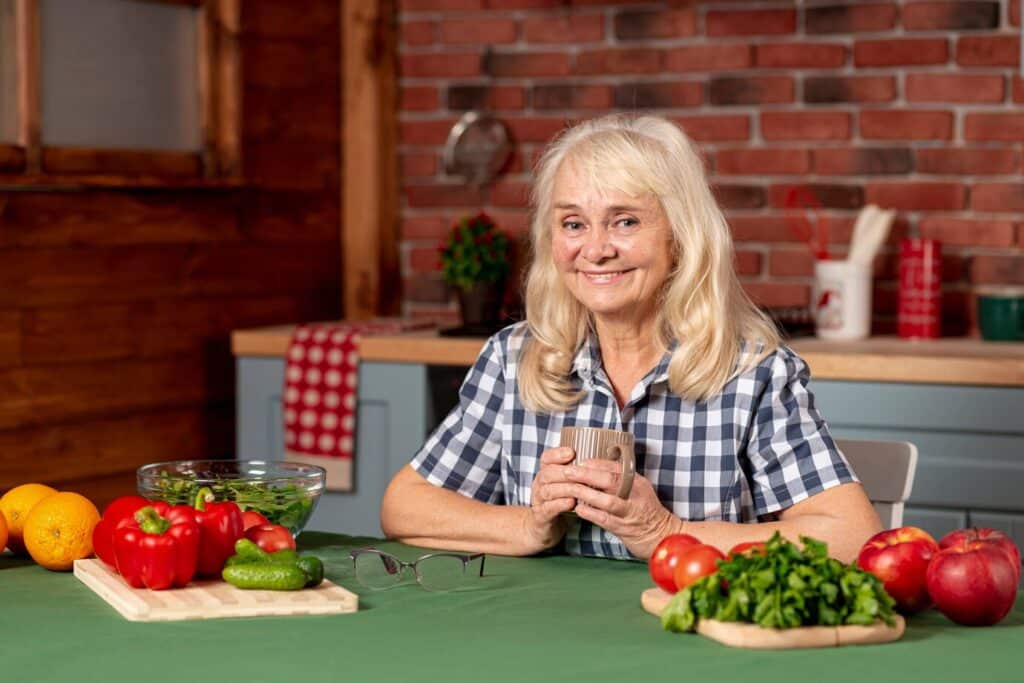The 7 Easy Steps To Starting A Plant Base Diet In Your 60s And 70s
Over the years, many individuals in their 60s and 70s have discovered the numerous health benefits of transitioning to a plant-based diet. Fear not if you’re considering making the switch, but feel overwhelmed by where to start! This blog post will provide seven easy steps to help you smoothly transition to a plant-based diet, even in your later years. Following these simple guidelines can improve your overall health, boost your energy levels, and enhance your well-being. Let’s look into the world of plant-based eating over 50 and kickstart your journey to a healthier lifestyle!
Key Takeaways:
- Gradual Transition: To make the transition easier on your body, start by gradually incorporating plant-based meals into your diet.
- Focus on Nutrient-dense Foods: Emphasize nutrient-dense foods such as fruits, vegetables, legumes, and whole grains to ensure you are meeting your nutritional needs.
- Stay Informed: Learn about the benefits of a plant-based diet for seniors and seek guidance from a healthcare professional or nutritionist.
Step One: Understanding Plant-Based Nutrition
Essential Nutrients and Where to Find Them
Understanding the nutrients needed in a plant-based diet is crucial for maintaining optimal health in your 60s and 70s. Westmont of Brentwood, a trusted senior living community in Brentwood, CA, emphasizes the importance of obtaining plant-based nutrients like protein, iron, calcium, and omega-3 fatty acids.
Debunking Myths about Plant-Based Diets
Debunking misconceptions about plant-based diets is necessary for making informed choices about your nutrition. Myths such as lacking protein or necessary vitamins are easily debunked with the proper knowledge and guidance. Westmont of Brentwood’s team of specialists can offer personalized advice and support to help you navigate the world of plant-based eating in your golden years.

Step Two: Gradual Transition Strategies
Phasing Out Animal Products
The transition to a plant-based diet in your 60s and 70s can be made more accessible by gradually phasing out animal products. With options like Westmont of Brentwood in Brentwood, CA, which provides delicious plant-based meal choices and support, you can slowly reduce your consumption of meat, dairy, and other animal products. This approach allows your taste buds and digestive system to adapt to new flavors and nutrients over time, making the shift more sustainable.
Incorporating More Whole Foods
Products with whole-food plant ingredients like fruits, vegetables, nuts, seeds, and legumes should become staples in your new diet. For instance, aim to fill half your plate with colorful fruits and vegetables at every meal. Westmont of Brentwood can help you select nutrient-dense whole foods that will provide the vitamins and minerals vital for aging well on a plant-based diet for seniors recipes.
Step Three: Planning Your Meals
Planning your meals is crucial to effectively transition to a plant-based diet in your 60s and 70s. This step will ensure you meet your nutritional needs while exploring a variety of plant-based foods for a well-rounded diet.
Meal Prep and Recipe Resources
Meal prep and recipe resources can simplify your journey to a plant-based diet. To expand your culinary skills with plant-based ingredients, utilize tools such as online meal planning platforms, cookbooks tailored for seniors like those by Westmont of Brentwood in Brentwood, CA, and cooking classes.
Sample Meal Plans for Beginners
Beginners may find it helpful to start with sample meal plans for those new to plant-based eating over 50. These plans offer a structured approach to menu planning and may include options for breakfast, lunch, dinner, and snacks to guide your daily food choices. Westmont of Brentwood in Brentwood, CA, offers customizable meal plans to meet the individual needs of seniors commencing on a plant-based journey.

Meal Prep
Step Four: Adopting Mindful Eating Habits
The Role of Mindfulness in Diet
It’s not just about what you eat but also how you eat; mindfulness plays a crucial role in maintaining a healthy plant-based diet for seniors’ recipes. By being present and engaged during meals, you can connect better with your food, thus enhancing your overall dining experience and satisfaction.
Tips for Conscious Eating and Portion Control
Adopting conscious eating habits involves listening to your body’s hunger cues and being aware of portion sizes. Start by eating slowly, savoring each bite, and using smaller plates to control portions. Consider keeping a food journal to track your eating habits and make mindful choices when selecting foods.
Avoid distractions while eating, such as TV or phone. Aim to stop eating when you feel satisfied, not overly full. Be mindful of emotional eating triggers and find alternative ways to cope. Four out of five participants in a study conducted by Westmont of Brentwood in Brentwood, CA, reported feeling more in control of their eating habits after incorporating mindful practices into their daily routine. Practicing mindfulness can also improve digestion and reduce overeating. Aim to include these strategies in your meals for optimal results.
Step Five: Overcoming Common Challenges
Eating Plant-Based on a Budget
Eating well on a plant-based diet doesn’t have to break the bank. Shopping for seasonal produce, buying in bulk, and cooking in batches can help save money. Westmont of Brentwood, located in Brentwood, CA, knows the importance of affordable nutrition for seniors and can provide valuable tips on budget-friendly plant-based eating over 50.
Navigating Social Situations and Dining Out
Social situations and dining out can present challenges on a plant-based diet. However, they can be navigated with a bit of planning and communication. Westmont of Brentwood offers support and strategies for dining out on a plant-based diet in Brentwood, CA. Situations like these happen daily as we strive to make healthy choices in a world that may not always be accommodating.

Plant-Based on a Budget
Step Six: Staying Motivated and Tracking Progress
Setting Realistic Goals
Setting realistic and achievable goals is crucial to successfully navigate the transition to a plant-based diet in your 60s and 70s. Allowing yourself the flexibility to adapt to your unique circumstances and gradually incorporating more plant-based meals can help make the process sustainable. Considering the health benefits of a plant-based diet, such as those offered by Westmont of Brentwood in Brentwood, CA, can also motivate staying on track.
Keeping a Food and Health Journal
Journaling your food intake and health progress can be valuable in staying motivated and tracking your journey towards a plant-based diet. By documenting your meals, energy levels, and overall well-being, you can gain insight into what works best for your body. This practice can help you identify patterns, track your progress, and make informed decisions about your diet. Keeping a detailed record can also be a source of accountability and motivation.
Step Seven: Continual Learning and Community Support
Once again, it’s essential to prioritize continual learning and community support in your plant-based journey. This will help you stay motivated, connected, and informed about new developments in the plant-based world.
Joining Plant-Based Groups and Forums
Forums are a great way to connect with like-minded individuals following a plant-based diet. You can find support, share tips and recipes, and stay updated on the latest trends in plant-based living. Consider joining online groups or forums like those offered by Westmont of Brentwood in Brentwood, CA, to connect with a community of individuals navigating the same dietary choices.
Attending Workshops and Cooking Classes
Attending workshops and cooking classes can provide valuable hands-on experience and knowledge about plant-based cooking techniques, ingredients, and recipes. These classes offer the opportunity to learn from experts and network with other plant-based enthusiasts. Stay engaged in your journey by participating in events like those hosted by Westmont of Brentwood, CA, where you can enhance your culinary skills and meet others who share your dietary goals.
As a reminder, transitioning to a plant-based diet in your 60s and 70s can be simple and enjoyable. By following these seven easy steps – from educating yourself on the benefits of a plant-based diet to gradually incorporating more fruits, vegetables, and whole grains into your meals – you can improve your health and well-being in your golden years. Consult with a healthcare provider or nutritionist before making significant dietary changes. Don’t hesitate to contact resources like Westmont of Brentwood in Brentwood, CA, at 925-516-8006 for support and guidance. Take the first step today towards a healthier and more vibrant lifestyle!

Continual Learning
Attending Workshops and Cooking Classes
Seven: Attending workshops and cooking classes can provide valuable hands-on experience and knowledge about plant-based cooking techniques, ingredients, and recipes. These classes offer the opportunity to learn from experts and network with other plant-based enthusiasts. Stay engaged in your journey by participating in events like those hosted by Westmont of Brentwood, CA, where you can enhance your culinary skills and meet others who share your dietary goals.
Dive into the vibrant life our Westmont communities have to offer.Find Where You Belong
FAQs About Plant-Based Diets for Seniors
Is a plant-based diet good for seniors?
Yes, a plant-based diet can be very beneficial for seniors. It is rich in nutrients like fiber, vitamins, and antioxidants, which promote heart health, support digestion, and may reduce the risk of chronic diseases such as diabetes and hypertension. However, it’s important to ensure a balanced diet that includes adequate protein, calcium, and vitamin B12 to meet the specific nutritional needs of older adults.
What is the best diet for senior citizens?
The best diet for senior citizens is one that is balanced, nutrient-dense, and tailored to their specific health needs. This often includes a variety of fruits, vegetables, whole grains, lean proteins, and healthy fats. Seniors should also focus on staying hydrated and limiting processed foods, sugar, and sodium to support overall well-being.
What do you not eat on a plant-based diet?
On a plant-based diet, you typically avoid animal products such as meat, poultry, fish, dairy, and eggs. Instead, the focus is on foods derived from plants, like fruits, vegetables, legumes, nuts, seeds, and whole grains. Some people on plant-based diets may still choose to include small amounts of animal products, but the emphasis remains on plant-based foods.
Is plant-based protein good for seniors?
Yes, plant-based protein is an excellent choice for seniors. Sources like beans, lentils, tofu, tempeh, nuts, seeds, and whole grains are rich in nutrients and easy to incorporate into meals. These proteins are also low in saturated fat, making them heart-healthy options, but seniors should ensure they consume enough to meet their protein needs for maintaining muscle mass and strength.









